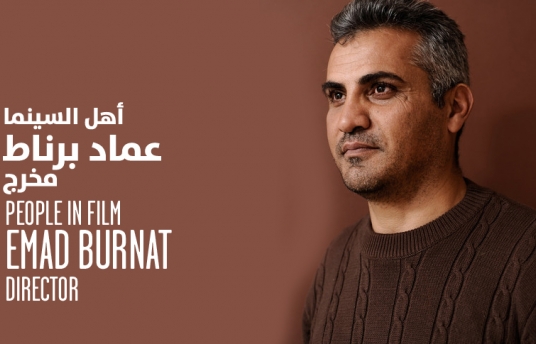People in Film: Emad Burnat
Feb 07, 2012

Films from Palestinian directors are a rarity. Which is why it was so pleasing to see Emad Burnat’s documentary debut, “5 Broken Cameras”, take the World Cinema Directing Award at Sundance recently. “5 Broken Cameras” chronicles his family’s life and resistance to Israeli settlement expansion over a seven year period.
DFI: Can you explain the circumstances behind “Five Broken Cameras”?
Burnat: The film is a personal story about the last seven years of my life. I was documenting the demonstrations in my village of Bilin. I was filming my family and my daily life. My fourth son was also born at the same time. When the soldiers came to the village, I was watching the effect this had on my family.
DFI: Why did you decide to chronicle your daily life in a documentary?
Burnat: When I decided to film and document what was happening in my village, I first decided to take my camera and use the footage for many purposes. For the internet, or the Israeli courts. I planned to use the footage from the camera to protect my family and my friends. After a couple of years, I had many, many hours of material. I decided to make a film from my point of view. I knew many film makers who to Palestine from outside – Israelis or international people. I believed in my story and wanted to reveal my situation.
DFI: Had you directed before “5 Broken Cameras”?
Burnat: This is my first documentary. Years ago, I made a small film just for the people in my village, or people who come to visit. It is called “Bilin Against the War”.
DFI: You broke five cameras during those last seven years. Can you describe the difficulties of repairing or replacing them in Palestine?
Burnat: I lost more than five cameras during the years. Some of them were repaired twice. Some were impossible to repair. Others were expensive, of course. But I wanted to keep filming. I got cameras any way I could. People who come to support the village from the international community helped me. Some cameras I bought with my money. But it was difficult. I do not have a job.
DFI: How difficult was it to find resident editing expertise in Palestine?
Burnat: Very difficult. We digitized and edited the footage over the last two years. We did our first edit it in Palestine. Then we did some more editing for two months in France.
DFI: What is the current state of film-making in Palestine?
Burnat: I think there are lots of film makers who make films. But the subject is always the same – the occupation and the wall. So there is no difference between the film and the news. When you make a film from my point of view, it is easier for outsiders to understand the situation. This is not just a film about occupation or war or soldiers. You need new ideas.
DFI: Your village is near Ramallah in the West Bank. Do you remember many cinemas there during your childhood?
Burnat: There were two cinemas in the city. I would go to these cinemas regularly. Nobody had television in those days. You had to go to cinema to watch films. When I was young, it was for us like a vacation to go to cinema. I liked to watch films about the war in Vietnam or fictional Arabic films. Everyone now has cinema at home. So I don’t need to go to cinema these days.
DFI: Can you name some of your recent favourite films?
Burnat: I like to watch American films like “No Country for Old Men”. And I liked “The Book of Eli”. I like to watch films starring Bruce Willis.